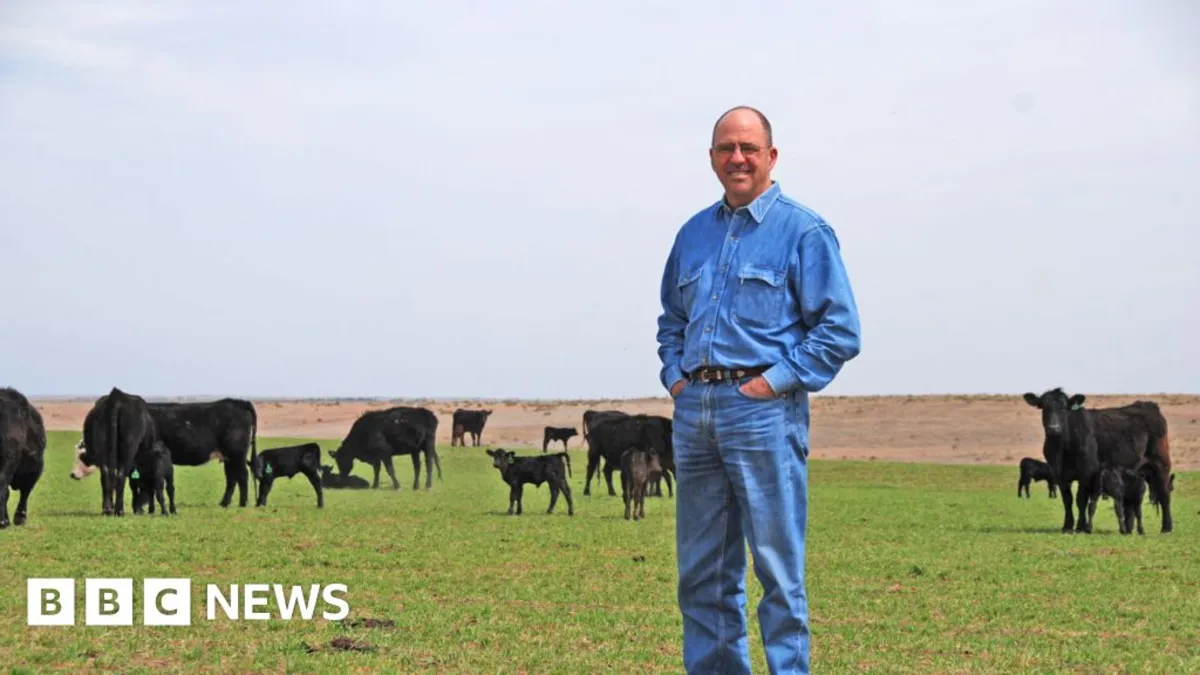
In recent months, beef prices in the United States have surged to unprecedented levels, transforming the issue into a significant political challenge. Even former President Donald Trump, who previously claimed that inflation was under control, has re-engaged with this topic, as rising beef costs threaten to undermine his promises to lower grocery prices for American households.
This week, Trump took to social media, urging ranchers to reduce the prices of their cattle. However, his demands, along with other initiatives proposed by his administration, have sparked significant backlash among ranchers. Many of them fear that the solutions being put forth will hinder their ability to sustain their livelihoods while making minimal impact on grocery prices for consumers.
The number of beef cattle farmers and ranchers in the US has been steadily declining since 1980, which has led to reduced domestic supplies and subsequently higher prices, even as demand for beef remains robust. According to the Agriculture Department, the nation's cattle inventory has reached its lowest level in nearly 75 years, with over 150,000 cattle ranches lost since 2017—a staggering 17% decline.
Ranchers are grappling with pressures stemming from four decades of consolidation among the meat processors that purchase their livestock. Additionally, soaring costs for essential inputs like fertilizer and equipment have intensified the economic strain. The situation has been exacerbated by several years of drought, compelling ranchers to significantly reduce their herds. Christian Lovell, a cattle rancher in Illinois, remarked that areas of his farm that were once lush and fertile have now dried up, limiting grazing options for his cattle. "You put all these together and you have a recipe for a really broken market," he stated, aligning with the advocacy group Farm Action.
The impact of these dynamics is evident in the retail market. According to recent data from the Bureau of Labor Statistics, retail prices for ground beef rose by 12.9% over the past year, with beef steaks increasing by 16.6%. A pound of ground chuck now averages $6.33, compared to $5.58 a year ago. These increases have significantly outpaced the general food inflation rate, which stands at just 3.1%.
As noted by Brenda Boetel, a professor of agricultural economics at the University of Wisconsin, River Falls, the continual decline in the cattle herd over recent years has not diminished the consumer demand for American beef, resulting in sky-high prices. Derrell Peel, a professor of agricultural economics at Oklahoma State University, predicts that prices will remain elevated at least until the end of the decade, given the time required to replenish herds. He emphasized that the Trump administration's options for interventions to reduce prices are limited.
This week, the Agriculture Department introduced a comprehensive package aimed at boosting domestic beef production. This initiative includes opening more land for cattle grazing and supporting small meat processors. However, the proposal faced backlash after Trump suggested importing more beef from Argentina, which could potentially quadruple purchases. Eight House Republicans expressed their concerns in a letter to the White House regarding Trump's import plans.
Even the National Cattlemen's Beef Association, which has traditionally supported Trump's policies, criticized the import strategy, arguing that it creates chaos for American cattle producers without addressing grocery store prices. In response, Trump reassured farmers that he is aiding them through tariffs limiting imports from Brazil, stressing the need for ranchers to lower their prices to satisfy consumer demand.
Many experts argue that the government could effectively address beef prices by tackling the overwhelming market dominance exerted by a few large companies. Currently, just four companies—Tyson, JBS, Cargill, and National Beef—control over 80% of the beef slaughtering and packing market. Austin Frerick, an agricultural and antitrust policy expert at Yale University, described these consolidated markets as exploiting both ranchers and consumers.
These meat processing firms have faced multiple lawsuits, including one from McDonald's, alleging collusion to inflate beef prices. Although Trump revoked a Biden-era order aimed at tackling corporate consolidation in the food industry, his administration has undertaken other initiatives to investigate competition issues within agriculture.
Mike Callicrate, who operates a cattle ranch in St. Francis, Kansas, shared his experience of surviving in the industry by eliminating the middleman and directly reaching consumers through his own stores. However, he recognizes that most ranchers lack the financial resources to make such a transition. Many have exited the industry and see little incentive to return. "We're not going to rebuild this cow herd—not until we address market concentration," Callicrate stated.
He expressed support for the Agriculture Department's plans to open more cattle grazing land to increase production and lower retail prices. However, he cautioned that without a viable market, entering the cattle business is unwise.